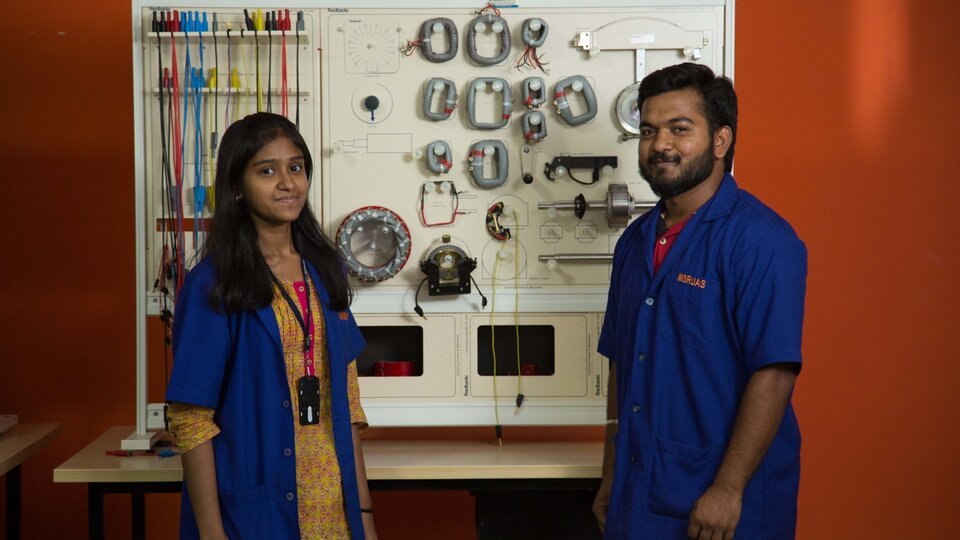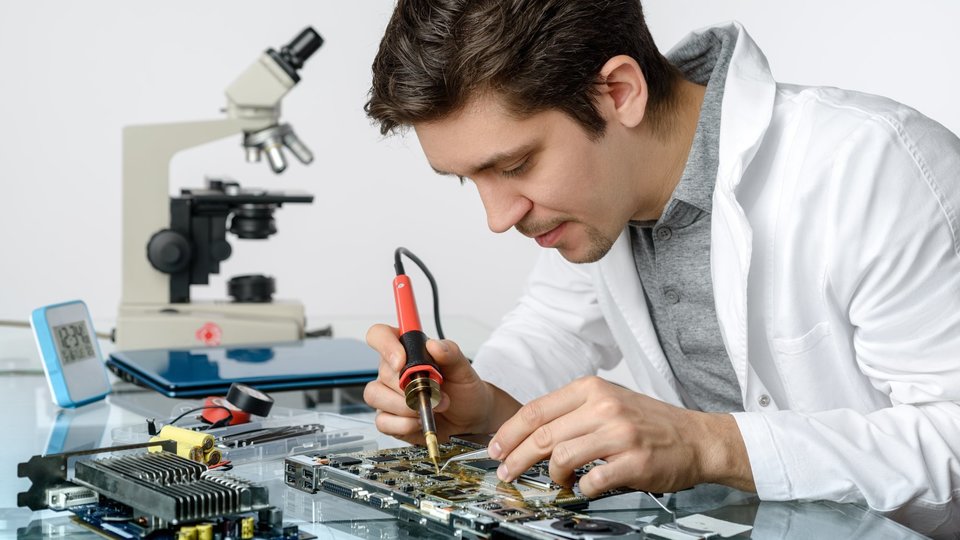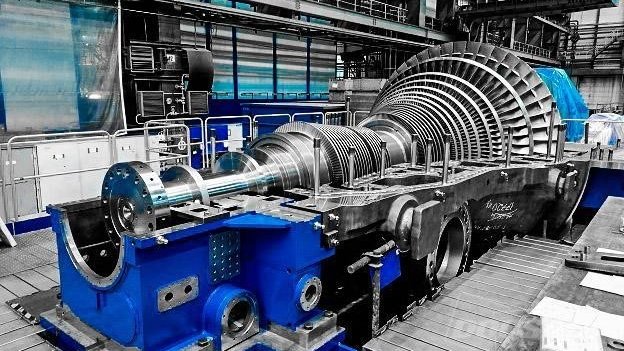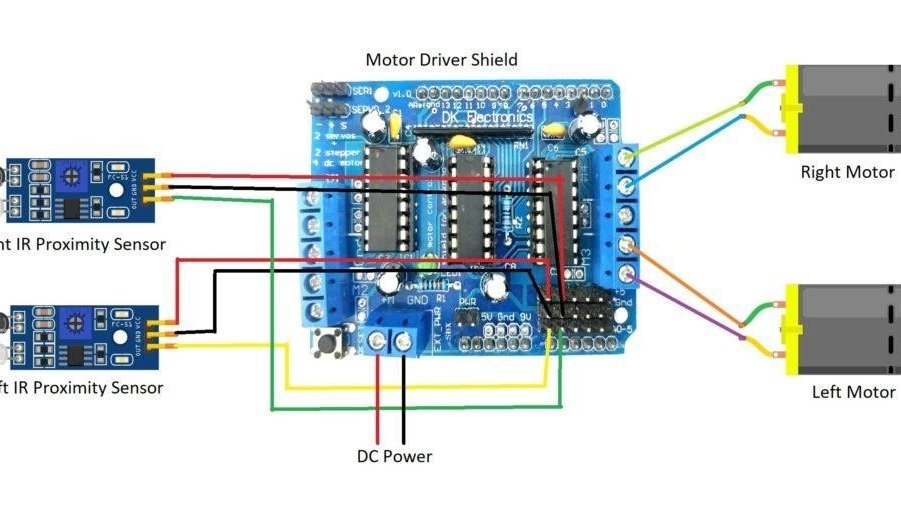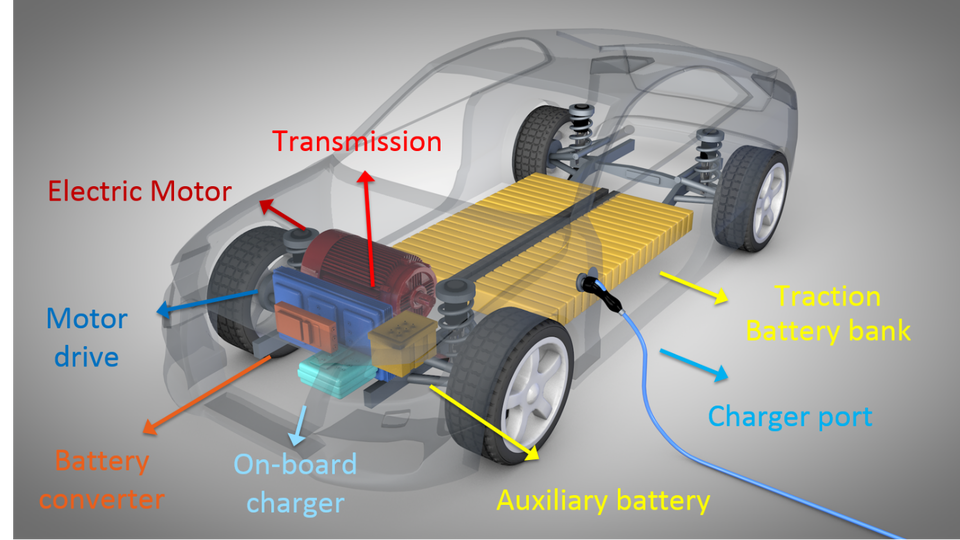B.Tech. in Electrical and Electronics Engineering
On this page
Overview
Objective
This program imparts a knowledge of electrical and electronic systems and sub-systems to enhance an understanding of engineering principles. It aims to –
- To impart domain knowledge and critical thought that can contribute to innovations beneficial to society to build leadership qualities.
- To help students understand engineering principles through modelling, simulation, and analysis to develop design skills, ability to test and validate.
- To enhance knowledge of modelling and designing electrical systems for a given application.
- To build, test and validate electrical and electronic systems by applying appropriate intelligent techniques.
- To help students simulate and analyse linear, non-linear systems using standard software tools.
- To provide a general perspective and opportunities for higher studies, or as entrepreneurs and a career in industry globally.
- To impart training on ethics, economics, human rights, law and interactive skills relevant to professional practice.
Highlights
Minor Programme
An additional program in which students can pursue a study of choice alongside the main degree. Students can register for this in consultation with faculty. This program is for aspirational candidates. Our program offers Electric Vehicles as a minor program and is open to all the engineering students in RUAS.
Proctoral System
Under the Proctoral System, every student is assigned a faculty member as a Proctor or a mentor.
These mentors offer guidance, support and encouragement to students, helping them as they progress along their academic journey. From the choice of electives to their academic performance, from attendance to meeting their credit requirements, students can approach these mentors with any and every query.
Proctors also interact with parents/guardians and keep them updated on the progress of students.
To ensure that they reap the benefits of the Proctoral System, students are advised to be in regular contact with their Proctors.
A Semester Abroad
We offer a program in which students can register a semester in the final year with a partner university, where students can do an internship or a project.
Innovation Centre
At the Innovation Centre, students team up with faculty members to bring their innovative ideas to life.
Ideas are assessed based on their relevance to — and impact on — society. These are then translated into working projects that are entered in national and international competitions, and for registration as patents.
Open Electives
Students can choose from a multitude of open electives across faculties for credits. These are specially designed courses which offer a basic introduction for a holistic development.
- Uses an outcome-based education system.
- Provides excellent infrastructure and faculty profiles.
- Uses an application-oriented curriculum to enable students to pursue higher education globally.
- Provides opportunities to upgrade domain knowledge through national and international conferences and distinguished lecture series.
- Includes internship, training, and placement support, including international placements.
- Provides opportunities with IEEE student branch, RUAS and Ramaiah Technology Business Incubators.
- Provides state of the art facilities in electrical machines, power electronics, power systems, high voltage, and control systems laboratories.
- Offers exposure to real time systems through industrial visits.
- Includes an annual project exhibition.
- Ensures participation in hackathons and innovation challenges.
- Our emphasis on applied brilliance translates into a campus that is buzzing with activity, whether in the form of guest lectures, seminars, workshops and industry events or student-organised activities and competitions.
- With 9 Faculties from different areas of study, multidisciplinary thinking is a way of life at RUAS.
- From a host of eateries and cafes to convenience stores and coffee vending machines, our campus has been designed and developed to ensure that the needs of every student are met.
- With access to RUAS’s numerous facilities, students are encouraged to participate in co-curricular sports and cultural events.
- The University offers a range of on-campus accommodation options. Third party, off-campus hostels are also available.
Structure
Study Domains
- ES
Engineering Sciences
An overview of all engineering sciences such as mechanical, electronic, and automotive engineering.
- PC
Professional Core
- A deep dive into the core domain of electronics and communication engineering, including signal processing, microprocessor/controller, and control systems.
- BS
Basic Sciences
- An overview of Mathematics, Physics, and Chemistry.
- HSS
Humanities and Social Sciences
- An introduction to professional and personal development, language courses, and life skills.
- OE
Open Electives
- Students can choose from a list of courses from multiple disciplines offered across the University to earn credits.
- PSI
Project, Seminar, and Internships
Course Progression
| Course | Credits |
|---|---|
Engineering Mathematics-1 | 4 |
Engineering Physics | 4 |
Elements of Mechanical Engineering | 3 |
Elements of Electronics Engineering | 4 |
Engineering Drawing | 3 |
Engineering Physics Laboratory | 1 |
Basic Workshop Practice | 1 |
Basic Electronics Laboratory | 1 |
Constitution, Human Rights and Law | 2 |
Key
- Theory
- Tutorials
- Practicals
| Course | Credits |
|---|---|
Engineering Mathematics - 2 | 4 |
Engineering Chemistry | 3 |
Engineering Mechanics and Construction Materials | 4 |
Elements of Electrical Engineering | 4 |
Elements of Computer Science and Engineering | 4 |
Engineering Chemistry Laboratory | 1 |
Computer Programming Laboratory | 1 |
Basic Electrical Engineering Laboratory | 1 |
Professional Communication | 2 |
Key
- Theory
- Tutorials
- Practicals
| Course | Credits |
|---|---|
Engineering Mathematics - 2 | 4 |
Engineering Chemistry | 3 |
Engineering Mechanics and Construction Materials | 4 |
Elements of Electrical Engineering | 4 |
Elements of Computer Science and Engineering | 4 |
Engineering Chemistry Laboratory | 1 |
Computer Programming Laboratory | 1 |
Basic Electrical Engineering Laboratory | 1 |
Professional Communication | 2 |
Key
- Theory
- Tutorials
- Practicals
| Course | Credits |
|---|---|
Engineering Mathematics-1 | 4 |
Engineering Physics | 4 |
Elements of Mechanical Engineering | 3 |
Elements of Electronics Engineering | 4 |
Engineering Drawing | 3 |
Engineering Physics Laboratory | 1 |
Basic Workshop Practice | 1 |
Basic Electronics Laboratory | 1 |
Constitution, Human Rights and Law | 2 |
Key
- Theory
- Tutorials
- Practicals
| Course | Credits |
|---|---|
Engineering Mathematics - 3 | 4 |
Signals and Systems | 3 |
Electronic Circuits | 3 |
Network Analysis | 4 |
Measurement and Instrumentation | 3 |
Electrical Machines ‐ 1 | 4 |
Electrical Machines Laboratory‐ 1 | 1 |
Electrical Circuits and Measurements Laboratory | 1 |
Environmental Studies |
Key
- Theory
- Tutorials
- Practicals
| Course | Credits |
|---|---|
Engineering Mathematics - 4 | 4 |
Digital Logic Circuits | 3 |
Electromagnetic Field Theory | 4 |
Embedded Microprocessor and Controllers | 4 |
Electrical Machines ‐ 2 | 4 |
Linear Integrated Circuits | 3 |
Embedded Microprocessor and Controllers Laboratory | 1 |
Digital Electronics Laboratory | 1 |
Key
- Theory
- Tutorials
- Practicals
| Course | Credits |
|---|---|
Transmission and Distribution | 3 |
Digital Signal Processing | 3 |
PLC and SCADA | 3 |
Control Systems | 4 |
Electrical Machine Design | 3 |
Estimation and Costing of Electrical Installations | 3 |
Electrical Machines ‐ 2 Laboratory | 1 |
Control System Laboratory | 1 |
Key
- Theory
- Tutorials
- Practicals
| Course | Credits |
|---|---|
Design and Computer Aided Drawing of Electrical Machine | 3 |
Switchgear and Protection | 3 |
Power Electronics and Drives | 4 |
Power System Analysis | 4 |
High Voltage Engineering | 3 |
Power Electronics and Drives Laboratory | 1 |
Power Systems Simulation Laboratory | 1 |
High Voltage and Relay Laboratory | 1 |
Key
- Theory
- Tutorials
- Practicals
| Course | Credits |
|---|---|
Professional Core Elective ‐ 1 | 3 |
Professional Core Elective ‐ 2 | 3 |
Professional Core Elective ‐ 3 | 3 |
Open Elective ‐ 1/ Mooc Course / Paper publication in Journal | 3 |
I] Project Work - 1 II]Internship (Choose one) | 6 |
Seminar | 1 |
Key
- Theory
- Tutorials
- Practicals
| Course | Credits |
|---|---|
Professional Core Elective ‐4 | 3 |
Open Elective ‐ 2/MOOC Course/ Innovation competition | 3 |
Project Work ‐ 2 | 10 |
Key
- Theory
- Tutorials
- Practicals
Details
FEES
Government Seats:
- As per Government of Karnataka for Indian nationals.
University Seats:
- Rs.240.000 Per Annum
Teaching and Assessment
During each semester, students’ performance is assessed through Continuous Evaluation (CE) and a Semester End Examination (SEE). CE and SEE weightages carry equal weightage.
Students are awarded grades based on the marks scored
Key Skill Development
- Ability to apply knowledge of mathematics, science, and Engineering fundamentals to solve complex problems in engineering
- Ability to analyse engineering problems, interpret data and arrive at meaningful conclusion involving mathematical inferences
- Ability to design an engineering system, component, or process to meet desired needs considering public health and safety, and the cultural, societal, and environmental considerations
- Ability to understand the effect of engineering solutions on legal, cultural, social and public health and safety aspects
- Ability to develop sustainable solutions and understand their effect on society and environment
- Ability to work as a member of a team, to plan and to integrate knowledge of various engineering disciplines and to lead teams in multidisciplinary settings
- Ability to adapt to the changes and advancements in technology and engage in independent and life-long learning
- Ability Enhancement Compulsory Courses (AECC) such as Professional Communication, Constitution, Human Rights and Law, and Environmental Studies
Career opportunities
- Academic position in engineering institutions.
- Researcher in operations management.
- Further studies in higher education.
- Electrical Contractor.
- Entrepreneurship.
- Positions in IES, IAS, and IPS.
- Opportunities in the power generation sector, the renewable energy sector and the government and public sector.
- Work in process industries, heavy, medium and small-scale manufacturing industries, the electric vehicles sector
Careers
Entrepreneur
Researcher
Electrical Contractor
Power Generation
Process Industries
Admissions
Eligibility
- Candidates must have passed 10+2 examinations with Physics and Mathematics as compulsory courses along with Chemistry, Biotechnology, Biology, Electronics or Computer science.
- Candidates from the general must have obtained at least 45% aggregate marks.
- Candidates from reserved categories must have at least 40% in case of in the above mentioned courses
Application Process
Through RUAS-AT
- Take the RUAS-AT Entrance Test
- Admission counselling for selection
- Once selected, students need to fill in the admission form
- Pay tuition fee
- Submit documents to the University
Through CET/ComedK
- CET Code E235, ComedK Code
- Counselling and Selection
- Download the admission form
- Submit completed form and documents at the University Admissions Office
- Pay fees online or through DD at the University admission Office. See full instructions.
Other Accepted Scores
- Contact Director of Admissions.
Fees & Scholarships
Government Seats:
- As per Government of Karnataka for Indian nationals.
- Rs.240.000 Per Annum
Eligibility
- Foreign students should have a qualification of 10+2 as approved by the Association of Indian Universities.
- Candidates should have proof of proficiency in English with a minimum TOEFL score of 8
Application Process
Through RUAS-AT
- Take the RUAS-AT Entrance Test
- Admission counselling for selection
- Once selected, students need to fill in the admission form
- Pay tuition fee
- Submit documents to the University
- See Documents for Indian Nationals
- See Documents for NRI/ OCI/ SAARC
Through CET/ComedK
- CET Code E235, ComedK Code
- Counselling and Selection
- Download the admission form
- Submit completed form and documents at the University Admissions Office
- Pay fees online or through DD at the University admission Office. See full instructions.
Other Accepted Scores
- Contact Director of Admissions.
Fees & Scholarships
USD 6000 + Other fee Rs.38550 per annum.
Eligibility
In all cases of lateral entry admissions, the decision of the Equivalence Committee will be final.
- Candidates from the general category must have passed a diploma examination from an approved institution with a minimum of 45% marks in an appropriate branch of engineering or technology.
- Candidates from the reserved category must have passed a diploma examination from an approved institution with a minimum of 40% in case of candidates in appropriate branch of engineering or technology.
- Candidates from the general category must have passed B Sc from a University recognized by the UGC with a minimum of 45% marks with Physics and Mathematics in the 12th standard.
- Candidates from the reserved category must have passed 12th with a minimum of 40% in Physics and Mathematics as courses.
Note: Up to 15% of seats are reserved for foreign / NRI Students
Application Process
Through RUAS-AT
- Take the RUAS-AT Entrance Test
- Admission counselling for selection
- Once selected, students need to fill in the admission form
- Pay tuition fee
- Submit documents to the University
- See Documents for Indian Nationals
- See Documents for NRI/ OCI/ SAARC
Through CET/ComedK
- CET Code E235, ComedK Code
- Counselling and Selection
- Download the admission form
- Submit completed form and documents at the University Admissions Office
- Pay fees online or through DD at the University admission Office. See full instructions.
Other Accepted Scores
- Contact Director of Admissions.
Fees & Scholarships
Government Seats:
- As per Government of Karnataka for Indian nationals.
Start your journey with RUAS
Downloads
Contact
- email hidden; JavaScript is required
- Phone
- +91 80 4536 6616
Programmes
- M.Tech. in Data Science and Engineering
- M.Tech in Artificial Intelligence & Machine Learning
- M. Tech. in Power Electronics and Drives
- B.Tech. in Electrical and Electronics Engineering
- B.Tech. in Electronics and Communication Engineering
- B.Tech. in Information Science and Engineering
- B.Tech. in Mathematics and Computing
- B.Tech. in Mechanical Engineering
-
- B.Tech. in Robotics
- B.Tech. in Civil Engineering
- M.Tech. in Construction Engineering and Management
- M.Tech. in Environmental Engineering and Management
- M.Tech. in Transportation Engineering
- M. Tech. in Automotive Engineering
- B.Tech. in Aerospace Engineering
- B.Tech. in Automotive Engineering
- M.Tech. in Aerospace Engineering
- B.Tech. in Computer Science and Engineering
- B. Tech. in Artificial Intelligence and Machine Learning
- M. Tech. in Advanced Machinery Design
- M. Tech. in Manufacturing Technologies and Engineering Management
- M.Tech. in Robotic Engineering
- M.Tech. in VLSI and Nanotechnology
- Electric Transportation
- Embedded System
- Machine Learning
- Mechanical Design
- M. Tech. in Structural Engineering

